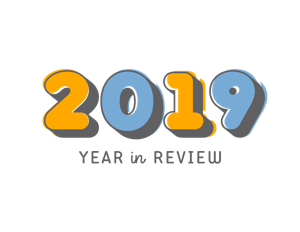I started my list of ten things a few times. I wanted to produce something funny, or at least clever, or at least literary. But if I’m honest, this is what 2019 was for me. A lot was disappearing. [1] 2019 was teaching my last classes. I’ve always wanted more time to write, but now I worry that I’m retiring too soon. Without my connection to my students, maybe I’ll have no function any more, no lifeline to humanity. [2] 2019 was watching videos online of the ice caps melting. Have you watched melting ice sheets with the sound on and heard the eerie clicking and trickling and booming? [3] 2019 was wondering whether I’d killed my last mosquito, my last fly, seen my last ladybug or spider in the garden behind our house. [4] 2019 was wondering how many birds and animals I’d seen for the last time. I wanted to be an ornithologist when I was twelve. I collected feathers and walked around the woods with a birdcall whistle and wrote down every bird I saw in a tiny notebook. Rachel Carson’s Silent Spring had come out, but I didn’t really believe that insecticides could completely destroy our soil, our water, our birds. There were so many! [5] 2019 was the year I started worrying about trees and how fast they were disappearing. Our son worked for an environmental activist group in Malaysian Borneo for a few years after he graduated college, and there’s a photo on our refrigerator of him crouching in a rainforest with an apple-cheeked young woman in a lavender headscarf and traditional garb, the two of them planting a foot-high tree. Seeing (but not seeing) that every day might be one of the reasons deforestation stays in the back of my mind. Developers have also felled enormous trees in my northern California neighborhood, defying ordinances that require permits. Trees that took hundreds of years to grow, gone. [6] 2019 was vanishing governmental protections, reading in the newspaper every morning about our federal government in shambles. Environmental regulations rescinded. Consumer protections rescinded. Guidelines for clean air and water. Safe food. Safe medications. Gun control. [7] 2019 was refreshing the news page during mass shooting after mass shooting and watching the numbers climb. 2019 was the year it no longer felt safe to attend public gatherings. [8] 2019 was watching the Amazon burn and listening to another world leader much like our own blame everyone but himself and sacrifice the world’s future to short-term profits for the very rich. [9] 2019 was breathing air thick with smoke from California wildfires miles away for the second year in a row. 2019 was hazy skies and eerie blood red suns and Technicolor sunsets. 2019 was checking the PG&E page every few hours to see whether our power was going to be turned off to prevent more fires, and how many days the blackout would last. [10] 2019 was watching affordable housing disappear and vast tent cities of the homeless in Oakland and San Francisco proliferate. 2019 was homeless men and women lying on sidewalks and huddled in doorways, arms outstretched for change. 2019 was a year that often felt dystopian. Yet for all of that, my 2019 was also filled with love, kindness, friendship, creativity, and hope. I hope yours was too.
Notes:
[1] 2019 was my last flash workshop. Next semester will be my last creative nonfiction workshop in my last year of teaching at a state university in the San Francisco Bay Area, and already I’m afflicted with such deep nostalgia. Workshop will be great and there will be a voice whispering in my ear, “That’s the last time you’ll teach that particular story, make that particular point, work with that particular student, make a difference in this particular way.” Of course it’s something I’ve wanted, unlimited time to write, but will I use it well? I tend to write the most when I have the least time. Maybe I’ll spend my days binge-watching Scandinavian noir on Netflix or reading police procedurals or poring over the Washington Post online. I’m already glued to social media and the news. Maybe I’ll realize how old I am and give up. Maybe I’ll realize how much time has already disappeared.
[2] In 2019 scientists estimated that irreversible ice loss in Antarctic glaciers had doubled in the past six years. Polar melt will affect marine food chains, raise sea levels, increase greenhouse gas emissions, and dramatically worsen extreme weather phenomena around the globe. According to the 2019 Arctic Report Card, permafrost ecosystems may already be releasing 1.1 billion to 2.2 billion tons of carbon dioxide a year. Our world is disappearing before our eyes. Does that make my writing matter more, or matter less?
[3] I tend to freak out over insects, the mosquito droning in the dark bedroom, flies buzzing in the kitchen, fleas jumping onto my ankles from a dog owner’s carpet. Especially if there’s more than one—several mosquitos in the bedroom, or ten flies clustered on the kitchen windowsill when the warm weather starts, or the sudden swarm of blowflies in our bathroom because of a dead animal under the floor. But I sort of know that insects are crucial to our ecosystems and how ominous it is that half of the world’s insects have disappeared. Yes, half. Scientists in 2019 called it an “unnoticed insect apocalypse.”
[4] According to an Audubon Society report in 2019, North America has lost close to one third of its birds. In 2019, 70% of the world’s primate species were considered threatened, and more than 40% were listed as Critically Endangered or Endangered. Scientists agree that the sixth mass extinction in the history of Earth is underway. All these numbers are probably putting you to sleep. It’s almost impossible to wrap your head around them. Would I be paying attention if my son hadn’t majored in Environmental Science and Public Policy? He was a brilliant student, an artist and a mathematician who loved history and Russian literature and Eastern religions, and his interests were so broad that choosing a major in college was a crisis for him. In retrospect his choice seems inevitable. Everyone his age and younger realizes that our planet is disappearing, and that right now nothing is more important.
[5] Some more numbers. We’ve got maybe 3 trillion trees on Earth, and at the present rate of attrition, they may all be gone within 300 years.
[6] In 2019, the systematic gutting and dismantling of U.S. government agencies that began in 2017 accelerated, removing basic protections that have been in place for decades. National parks were vandalized during the federal government shutdown in January. Joshua Tree was damaged beyond repair. Scores of scientists were fired from government advisory boards. Air pollution scientists fired from the EPA in 2019 gathered in Washington, DC anyway to continue their work. Crucial positions were left unfilled or filled with laughably unqualified candidates with ties to industry. It was a year when we got used to reading news like that every day.
[7] They don’t even make headlines any more. There were 399 mass shootings in the U.S. in 2019. 1,604 people were wounded, 466 people were killed. Shootings happened at festivals, at movie theaters, at malls, at workplaces, at places of worship, at universities and schools. Four people were killed and seventeen wounded at the Gilroy Garlic Festival an hour away from where I live. There was a lockdown at the university where I teach. There were over 30 homicides in San Francisco in 2019, over 70 in Oakland, most involving guns. Guns are the second leading cause of death for American children and teenagers, the first leading cause of death for Black American children and teenagers.
[8] In 2019, 2,240,000 acres of Amazon rain forest in Brazil were cut down and burned, posing a threat not only to biodiversity and indigenous tribes, but to world climate, which depends on the absorption of carbon dioxide to mitigate global warming. Every year brings more catastrophic wildfires all over the world.
[9] Almost 7,000 fires burned over 250,000 acres in California in 2019. PG&E predicted that customers in Northern California can expect rolling blackouts for days at a time during fire season for at least ten years.
[10] In 2019, the median price of a house in San Francisco rose to $1.6 million. The number of homeless in San Francisco was estimated to be over 9,500, a 17% increase from 2017. Tech industries have changed the face of the entire Bay Area, dramatically increasing the gap between the obscenely wealthy and the homeless, squeezing out lower class and middle class residents. My son spends half his salary on rent in a shared apartment in an unsafe neighborhood in Oakland. My writer friends are moving away because they can’t afford to live here. Faculty turn down job offers at the university where I teach because the cost of living in the Bay Area is so high. I have students who live in their cars. After twenty-five years, my husband and I just paid off our small house in the East Bay, which is definitely an achievement to celebrate. Our house is now worth more than three times what it was worth when we bought it, which should be gratifying, but really isn’t. There’s so much I love about the literary and arts scene in San Francisco, the California coast and redwoods, the mixture of immigrants and ethnic groups in the state, California’s forward-thinking environmental policies, but I’d prefer to live in a place where ordinary people can afford to buy a home. I have a roof over my head, my family is safe, my writing is going well, my job is going well. But along with joys and achievements, 2019 was the year of seemingly permanent worry about the future of the U.S. and the planet. 2019 was the year when Trump was finally impeached. Only 2020 will tell whether that had any effect at all, and whether the youth of the world can mobilize against climate change in time to slow what’s disappearing all around us.

Jacqueline’s flash nonfiction piece with us, “The Arithmetic of Memory” proved two things: she’s good at math and she’s great at writing. This list proves she’s also pretty great at knowing what’s going in this world and that it’s going to take all of us to keep it from disappearing. And also still math.


































































